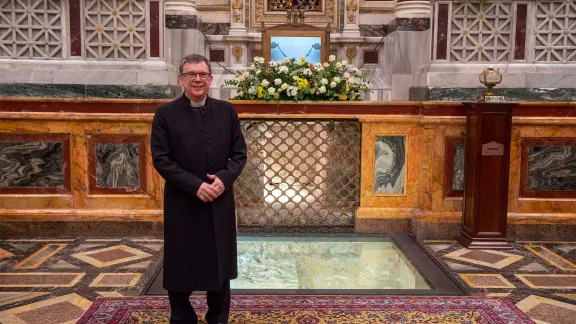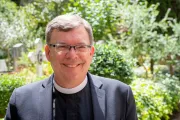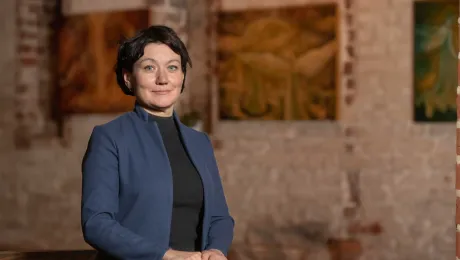
Prof. Dirk Lange beside the Apostle’s tomb in the Roman Basilica of Saint Paul Outside the Walls for the closing of the 2024 Week of Prayer for Christian Unity. Photo: CatholicPressPhoto/A. Giuliani
In this Nicaean Jubilee year, let us “re-engage with the Trinitarian faith that sustains all our life and work”
The prayers and reflections for Christian Unity Week 2025 take us on a unique journey into the sources of our faith. In this year of jubilee, celebrating the 1700 years of the First Ecumenical Council of Nicaea (325), we re-engage with the Trinitarian faith that sustains all our life and our work.
The reflections this year are focused on John 11:17-27 and Jesus’ question to Martha: “Do you believe this?” Written by the ecumenical community of Bose, the introductory reflection states, “the first generations of Christians could not remain indifferent or passive when the words of Jesus touched and searched their hearts…”. Is that not true for us today as well? How can we remain silent knowing God’s good intent, God’s plan of life for all humanity and all creation? “I am the Resurrection and the life”, Jesus says.
Jesus’ question to Martha, “Do you believe this?” is also addressed to us. Our response is initially an individual response of faith, but it cannot only be individual. Our response is communal, liturgical, confessional. Together, as community, we respond with the words of the Nicene-Constantinopolitan Creed (or Nicene Creed): “We believe…”.
“Do you believe this?”
We believe that God is the source and giver of life, that God has defeated death. Today, death takes on many forms, not just our earthly, physical death. Death is present in the arrogance of war that disrespect human life, death is present in the suffering caused by violence of all sorts, in the hatred towards migrants and refugees, towards all those who do not look or act or think “like us”. Death is present in the oppression of success and in the amassing of wealth by a few at the expense of many, creating greater divides within humanity. It is present in lies and fake narratives and in false accusations and suspicion of our neighbors, breaking the 8th commandment.
Confronted with the death of Lazarus, Jesus asks us: Do you believe this? This question calls forth a confession. The Augsburg Confession is an example of a response. It states: We believe this… and begins with an affirmation of the ancient creeds, citing the Nicene Creed. The Augsburg Confession points to the heart of the Gospel: justification by faith but justification that is encountered tangibly in Word and sacrament, that is, in the church, in community, and in good works, in works of justice.
“What does it mean for us to confess today?”
Confronted with death, Jesus asks us today: Do you believe this? What does it mean for us to confess today? Confessing today is in part naming the many ways death infiltrates the lives of people and societies. It means confronting death. Confessing today points to the Gospel – the Gospel “purely preached and the holy sacraments administered according to the Gospel”, as the Augsburg Confession describes it (Article 7). That is, confessing today points to the Gospel without any additions (for example, when conditions are placed on the Gospel: to be saved or to be “in”, you have to be a certain type of person, a certain color or gender or possess a certain status or class or education). Confessing points to God’s act of liberating humankind and creation, breaking down all these barriers and prisons that we so quickly build.
Confessing today directs us to God’s act of continually reclaiming and reconciling the world, humankind and creation. Through our confession, we discover that unity that God alone creates and offers us.
The annual Week of Prayer for Christian Unity is traditionally marked in the northern hemisphere from 18 to 25 January, while churches in the Global South often celebrate it around the feast of Pentecost. Each year, the World Council of Churches and the Vatican Dicastery for Promoting Christian Unity publish resources and reflections that have been prepared in partnership with Christian communities or churches in different parts of the globe.



